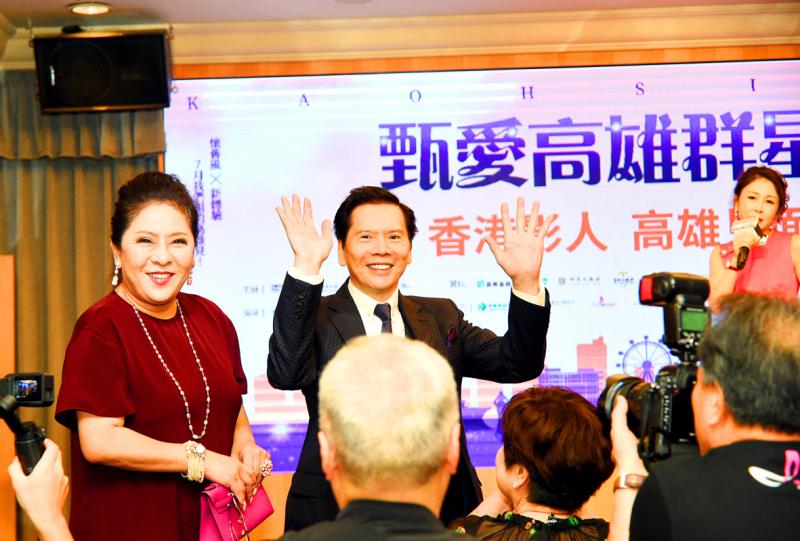Hong Kong entertainment tycoon Charles Heung’s (向華強) application for Taiwanese residency is likely to founder due to his ties to Beijing, a source connected to the national security establishment said.
Heung is chairman of China Star Entertainment (中國星). The former actor is perhaps best known for playing a supporting role in the 1989 film God of Gamblers.
Heung filed the residency application on the grounds that his wife, Tiffany Chan (陳嵐), is Taiwanese, and his family have been lobbying lawmakers to facilitate his immigration bid, said the source, who spoke on condition of anonymity.

Photo: Chang Chung-yi, Taipei Times
However, national security officials believe that Heung is a potential security risk, the source said.
As a pro-Beijing celebrity in good standing with the Chinese Communist Party and a fortune in the billions, Heung has no reason to leave Hong Kong, the source said.
When China’s National People’s Congress promulgated the National Security Law in Hong Kong, Heung was one of 3,000 celebrities to sign a public statement supporting the controversial legislation, the source said.
Heung’s family has deep ties to Hong Kong’s largest criminal organization, the Sun Yee On, the source said.
Another issue is that Heung’s son Jackie Heung (向佐) is a known member of the National Committee of the All-China Youth Federation, an organ bearing a strong connection to the Chinese Communist Youth League, they said.
Writing on social media during anti-extradition bill protests in Hong Kong last year, Chan called for the security apparatus to ban masks, accusing the protesters of “acting like animals and demons under the cover of masks,” the source said.
Being eligible for residency does not mean the application will be granted, the source said, adding that the evaluation process protects national security and the interests of Taiwanese.
Economic Democracy Union convener Lai Chung-chiang (賴中強) yesterday said that the government should approach the issue of Hong Kong immigrants from the perspective of defending Taiwan’s democratic way of life.
“A powerful player of Hong Kong’s entertainment world could import China’s political censorship if they are allowed to develop their career in Taiwan,” Lai said. “This has the potential to transform Taiwan’s entertainment industry in a worrisome direction.”
A spokesperson for the Taiwan-based Hong Kong Outlanders, who uses the pseudonym Justine, said that Taipei should reject the residency applications of Hong Kongers who support Beijing, or have an institutional affiliation to the Chinese government or military organizations.
“Such measures are necessary to protect the safety of Taiwanese and Hong Kongers living in Taiwan,” Justine said.
Democratic Progressive Party Legislator Fan Yun (范雲) said that Taiwan must look to its national security as the nation extends its friendship to Hong Kong.
“When Hong Kongers seek immigration to Taiwan, whether it is on grounds of family or as an investor, the government should look at their record, examine their potential ties to organized crime and be mindful of the national security angle,” Fan said.

MAKING WAVES: China’s maritime militia could become a nontraditional threat in war, clogging up shipping lanes to prevent US or Japanese intervention, a report said About 1,900 Chinese ships flying flags of convenience and fishing vessels that participated in China’s military exercises around Taiwan last month and in January last year have been listed for monitoring, Coast Guard Administration (CGA) Deputy Director-General Hsieh Ching-chin (謝慶欽) said yesterday. Following amendments to the Commercial Port Act (商港法) and the Law of Ships (船舶法) last month, the CGA can designate possible berthing areas or deny ports of call for vessels suspected of loitering around areas where undersea cables can be accessed, Oceans Affairs Council Minister Kuan Bi-ling (管碧玲) said. The list of suspected ships, originally 300, had risen to about

DAREDEVIL: Honnold said it had always been a dream of his to climb Taipei 101, while a Netflix producer said the skyscraper was ‘a real icon of this country’ US climber Alex Honnold yesterday took on Taiwan’s tallest building, becoming the first person to scale Taipei 101 without a rope, harness or safety net. Hundreds of spectators gathered at the base of the 101-story skyscraper to watch Honnold, 40, embark on his daredevil feat, which was also broadcast live on Netflix. Dressed in a red T-shirt and yellow custom-made climbing shoes, Honnold swiftly moved up the southeast face of the glass and steel building. At one point, he stepped onto a platform midway up to wave down at fans and onlookers who were taking photos. People watching from inside

Japan’s strategic alliance with the US would collapse if Tokyo were to turn away from a conflict in Taiwan, Japanese Prime Minister Sanae Takaichi said yesterday, but distanced herself from previous comments that suggested a possible military response in such an event. Takaichi expressed her latest views on a nationally broadcast TV program late on Monday, where an opposition party leader criticized her for igniting tensions with China with the earlier remarks. Ties between Japan and China have sunk to the worst level in years after Takaichi said in November that a hypothetical Chinese attack on Taiwan could bring about a Japanese

STREAMLINED: The dedicated funding would allow the US to transfer equipment to Taiwan when needed and order upgraded replacements for stockpiles, a source said The US House of Representatives on Thursday passed a defense appropriations bill totaling US$838.7 billion, of which US$1 billion is to be allocated to reinforcing security cooperation with Taiwan and US$150 million to replace defense articles provided to the nation. These are part of the Consolidated Appropriation Act, which the US House yesterday passed with 341 votes in favor and 88 against. The act must be passed by the US Senate before Friday next week to avoid another government shutdown. The US House Committee on Appropriations on Monday unveiled the act, saying that it allocates US$1 billion for the Taiwan Security Cooperation Initiative